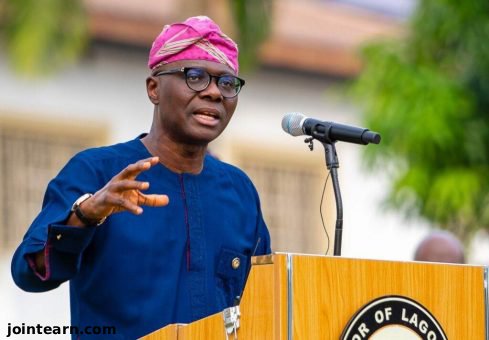
Lagos State is strengthening its position as Nigeria’s hub for agricultural innovation, leading a sweeping transformation of its food systems and local economy. Governor Babajide Olusola Sanwo-Olu said the state’s strategy—driven by technology, youth empowerment, and modern market infrastructure—is reshaping how food is produced, processed, and distributed. He made this known at the second edition of the Lagos Agrinnovation Summit.
Sanwo-Olu, represented by the Deputy Chief of Staff, Mr. Sam Egube, said the initiatives fall under the Lagos State Agricultural and Food Systems Roadmap (2021–2025) and align with the THEMES+ Agenda, which seeks to position Lagos as a 21st-century economy. The goal, he said, is to transform agriculture “from subsistence to sustainability, from potential to prosperity.”
Building a Modern Agro-Market System
Central to the state’s transformation plan is a three-tier agro-marketing structure comprising the Lagos Central Food Security Systems and Logistics Hub (LCFSSLH), mid-level agro hubs, and last-mile distribution outlets.
Phase 1 of the LCFSSLH in Ketu-Ereyun, Epe is at an advanced stage, while mid-level hubs in Abijo (Ibeju-Lekki) and Dairy Farm (Agege) are nearing completion. Additional hubs at Opebi (Ikeja) and Bombata (Lagos Island) are underway, with more planned for Ikorodu, Lekki, and Festac. Eventually, each LGA will host at least one hub to reduce post-harvest losses and improve market access.
The state is also investing in agro-industrial projects such as the Lagos Rice Mill, Imota (producing 2.5 million 50kg bags annually), the Cattle Feedlot Project (100,000 cattle annually), and the Lagos Aquaculture Centre of Excellence (LACE), set to produce 50 million fingerlings, 2,000 tonnes of fish, and 24,000 tonnes of aquafeed yearly.
Boosting Production Through Technology and Price Stabilisation
Through the Eko Agro Mechanisation Programme and the Tractor-On-The-Go (TOG) mobile app, the state has cultivated over 3,000 hectares and supported more than 500 farmers. To stabilise food prices and guarantee market access, the government launched the Produce for Lagos Programme and a ₦500 billion Guarantee Offtake Fund, providing farmers with pre-agreed pricing and assured offtake.
This system, Sanwo-Olu said, “connects production to market access, de-risks investment, and stabilises food prices.”
Lagos is also working to bring down the price of eggs and staples ahead of the festive season. With a crate of eggs rising to ₦5,400–₦6,000 in some areas, the government is pushing prices below ₦5,000 through the Ounje Eko Farmers’ Subsidy Programme (Phase II).
Commissioner for Agriculture and Food Systems, Ms. Abisola Olusanya, said Phase I supported more than 5,000 farmers, resulting in the production of over 7 million eggs from 258,000 layer birds. The state also supplied nearly 1,000 metric tonnes of poultry feed and 265 metric tonnes of fish feed.
New Subsidies, Broader Relief Measures
Phase II, set to launch before the end of the month, will offer a 25% subsidy on key poultry and fish feeds and free grains for pig farmers. Crop farmers will receive free fertiliser to boost productivity. The intervention will run across 10 major hubs, including poultry and fish estates and agricultural service centres.
To further ease costs for consumers, the state will also offer a 25% discount on 11 essential food items throughout the festive season at the Lagos Fresh Food Hub in Mushin.
Lagos is additionally providing subsidised mechanisation services and new equipment—including power tillers, mini tractors, and corn threshers—to farming clusters across the state.
Preparing the Next Generation of Agripreneurs
Beyond market interventions, Lagos is cultivating a new generation of agricultural innovators. Since 2020, the Lagos Agripreneurship Programme (LAP) has trained over 5,000 youths and women, with more than 2,000 receiving inputs and assets to start agribusinesses. The 2025 cohort is training an additional 1,100 participants.
The state is also nurturing innovation through the Lagos Agrinnovation Club, which links young creators to global partners and funding. The initiative produced the Lagos Agrithon, which awarded ₦100 million in grants to 26 finalists last year. This year, a new ₦150 million fund has been launched to support agritech solutions.
A Youth-Led Future for Lagos Agriculture
In her remarks, Olusanya said Lagos is building a “youth-led, resilient, and efficient ecosystem” powered by advanced technologies. She highlighted success stories of young innovators turning rooftops into farms, converting waste into animal feed, and building digital platforms that connect farmers and buyers instantly.
“Feeding a city of over 24 million people is not the work of one institution—it is the work of a system,” she said.
“Through partnerships, mentorship, supportive policies, and belief in our youth, we are building the foundation for something extraordinary.”
With sustained investments in infrastructure, innovation, and farmer support, Lagos is emerging as a continental model for urban food systems transformation. As Olusanya concluded, “We are building a Lagos where agriculture thrives, farmers prosper, and every household can afford nutritious food.”


Leave a Reply